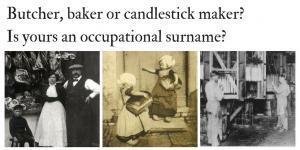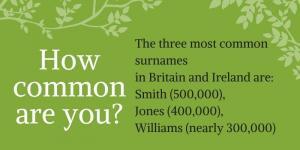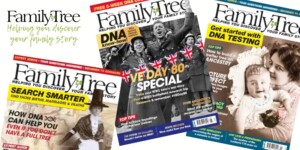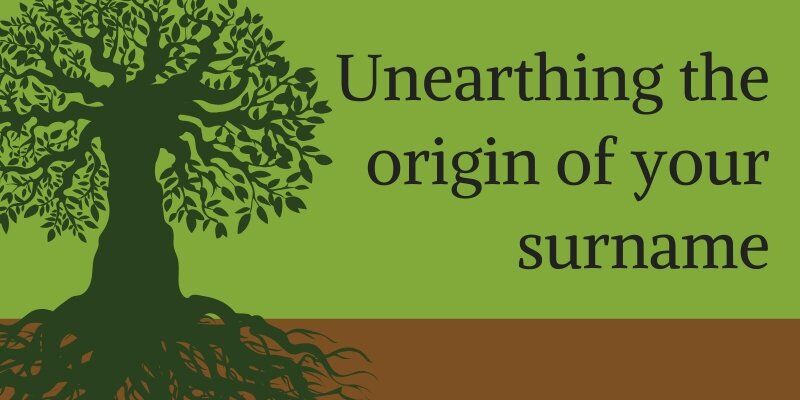Whether you’re a genealogy guru or family history fledgling, if you’re interested in your ancestral roots, unearthing the origin of your surname can be extremely illuminating.
Whoever thought up the notion of surnames? We take it for granted that each of us has an assigned family name which forms part of our identity and rarely consider that each name was chosen for a specific reason. Yet understanding those reasons can offer a fascinating insight into our family history. In England alone, there are more than 45,000 different surnames – each with a unique history to uncover. What is your surname origin?
We are extremely grateful to Abi Manning (derives from ‘maningi’, meaning valiant or strong) of Mole Valley Farmers for providing this article. Like Hall of Names, Mole Valley Farmers is a business that is based in the West Country. They are a leading agricultural supply business spanning the length of Britain (like we do). The company puts excellent customer care at the heart of the business, an ethos we fully support! . Plus, we love to work with and support fellow businesses in our region. Thank you to Abi and Mole Valley Farmers for their help in contributing this fascinating article.
Why do we have surnames?
Anglo-Saxon communities were small enough that surnames were not needed, although nicknames based on physical attributes or paternity were commonly assigned as an identifier. Examples include the likes of Goduuinus Wachefet (Godwine Weak-feet) or Cuthbert Edmund’s Son (Cuthbert, son of Edmund).
It was after the Norman Conquest in Britain, when the population increased and more and more people began to live in communities, that surname origins as we know them came into existence. As evidenced in the Domesday Book, they were initially used only by the nobility and gentry but soon disseminated to the rest of the population (most English people had one by around 1400). The old nicknames fell out of fashion and were largely lost, whereas many Norman-assigned names still survive today.
What’s happened since then?
New surnames continued to crop up after the Norman invasion and the increase in immigration over the following years introduced a variety of yet more new names to the nation. Irish, Highland Scottish and Welsh names are largely derived from Gaelic personal names and the union of England and Wales in 1536 saw the latter adopt the English system of surnames. Given the evolving nature of names and their origins, the road isn’t always clear for surname explorers investigating their ancestry. Multiple surname origins can cause a stumbling block: for example, Cowell could be Irish (son of battle chief), Gaelic (son of Saint Comhghal) or English (either from the place name Cowhill or a variant on the name Cole).
Spelling can also cause confusion. Intentional amendments, lack of literacy or simple evolution have caused variation over time. Significant changes also occurred in the 19th century due to the introduction of standardised spelling.
Seven categories of surname origin commonly found in the UK
Where does yours fit?
Ancestral – Les Dawson
Often given to sons of important figures in the community, male-derived (patronymic) names include the likes of Jackson (son of Jack).
Female derived (matronymic)
Names such as Emmott (from Emma) tended to be appointed to the daughters of unwed or widowed mothers.
Scottish ancestral clan names
Names including Douglas and MacDonald, also endure. Andrews, Anderson, Benson, Davidson, Dawson, Hampson, Harrison, Jefferson, Peterson, Richardson, Robertson, Robinson, Simpson, Thompson, Williams, Wilson. (Is your surname origin Scottish? Read about our clan histories here).
Geography – Victoria Wood
This rather romantic naming method suggests the surroundings in which one’s ancestors lived (Brook, Forest). Bridge, Burn, Bush, Field, Hill, Holt, Knill, Moore, Perry, Stone, Wood.
Patronage – Bill Hickman
Names that honour a patron include the likes of Kilpatrick (follower of Patrick) and Hickman (Richard’s man). Other examples of this surname origin are Palfreyman, Putman and Rickman
Occupation – Karen Carpenter
High-flyers of the 11th century were given names to signify their important role (Bishop, Mayor). Later this stretched to craftspeople and other occupations. For example, occupational surnames include Mason, Potter, Farmer, Archer, Baker, Carpenter, Cook, Cooper, Fletcher, Gardener, Knight, Major, Monk, Piper, Pope, Smith, Squire, Taylor, Wright. Is this you?

Occupational surnames describe the job a person did
Characteristic – Thomas Hardy
Similar to the Anglo-Saxon practice of nicknames, these reflect a personality trait or physical feature (Short, Strong). For example, surnames of this origin include Black, Little, Peacock, Red, Russell, Swift, White are also characteristic names.
Place – Richard Burton
Where a person lived, worked, owned land or was born can be reflected in a surname. Some are obvious (London, Burton) but others reflect an old English place name or a more specific location (Appleton – apple orchard). Other names are for example Bedford, Bristow, Duffield, Hamilton, Hampshire, Preston, and Thorpe
Estate – Elizabeth Windsor
From a land-owning lineage? Many think those with a surname relating to an estate were attempting to strengthen their claim to the land. Name examples include Staunton and Windsor.
(Read our blog on the hidden meaning of surnames here).
Modern mayhem
Surnames are still evolving today as people bend tradition and create new ways of identifying themselves to others. The patriarchal name passed down the family line is increasingly being eschewed in favour of creating double barrelled names. Alternatively, entirely new surname origins arise when two people in a couple blend their surnames, fro example combining O’Dowd and Porter to become O’Porter. Also it is more popular to retain a maiden name or acquire a woman’s surname instead of a man’s. Future generations attempting to uncover their family history will see a fascinating snapshot of the nature of surname identity when uncovering the varied name choices of their ancestors from the 20th and 21st centuries.

Double-barrelled surnames are more popular than ever!
International affairs – surname origins around the globe.
In Somalia, children have no family name but are given three personal names: their own name, their father’s name, and their paternal grandfather’s name.
In Afghanistan, people traditionally have only a first name. Last names will very occasionally be given which relate to place of birth, tribe, profession or honorific quality.
In China, family names precede a person’s given name. Around 70 per cent of the Chinese population have one of just 15 family names, which include Pan, Cheng and Tang.
In Russia, names have three parts: a given name, a patronymic middle name and the father’s surname.
Surnames: a protected species
On the brink of extinction (just a handful left)
Miracle, Relish, Birdwhistle
Endangered (under 200 left)
Ajax, Gastrell, Slora
Missing, presumed extinct
Bread, Spinster, Bythesea

Is yours a common surname?
To discover more about your own surname, click here to view our coat of arms and surname history scroll. It’s so easy to check for your name by entering it in our free family name search at the top of the page. A surname scroll makes the ideal personalised gift for any occasion, and there are many other stunning gifts available to browse here.
Useful Resources
Our friends at Family Tree Magazine have lots of useful articles including this one about surnames and their origins.

Family Tree Magazine is packed with tips for anyone researching their ancestry.



